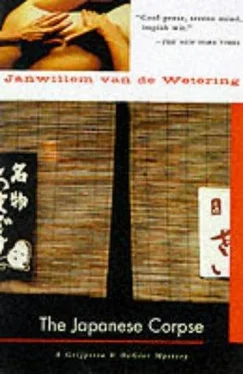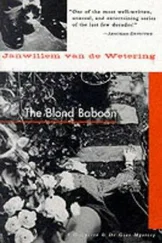Janwillem De Wetering - The Japanese Corpse
Здесь есть возможность читать онлайн «Janwillem De Wetering - The Japanese Corpse» весь текст электронной книги совершенно бесплатно (целиком полную версию без сокращений). В некоторых случаях можно слушать аудио, скачать через торрент в формате fb2 и присутствует краткое содержание. Жанр: Полицейский детектив, на английском языке. Описание произведения, (предисловие) а так же отзывы посетителей доступны на портале библиотеки ЛибКат.
- Название:The Japanese Corpse
- Автор:
- Жанр:
- Год:неизвестен
- ISBN:нет данных
- Рейтинг книги:3 / 5. Голосов: 1
-
Избранное:Добавить в избранное
- Отзывы:
-
Ваша оценка:
- 60
- 1
- 2
- 3
- 4
- 5
The Japanese Corpse: краткое содержание, описание и аннотация
Предлагаем к чтению аннотацию, описание, краткое содержание или предисловие (зависит от того, что написал сам автор книги «The Japanese Corpse»). Если вы не нашли необходимую информацию о книге — напишите в комментариях, мы постараемся отыскать её.
The Japanese Corpse — читать онлайн бесплатно полную книгу (весь текст) целиком
Ниже представлен текст книги, разбитый по страницам. Система сохранения места последней прочитанной страницы, позволяет с удобством читать онлайн бесплатно книгу «The Japanese Corpse», без необходимости каждый раз заново искать на чём Вы остановились. Поставьте закладку, и сможете в любой момент перейти на страницу, на которой закончили чтение.
Интервал:
Закладка:
"Us?" de Gier asked.
"Us. The Dutch. Merchants. We were allowed to buy things from them and they learned things from us. Medicine and how to make guns."
"Yes," de Gier said sleepily, "so the one favor equals the other, but I seem to remember that we ought to be grateful for something and that we are repaying a favor, us, I mean, you and I, running about like dumb rabbits so that the yakusa can shoot at us."
"Yes, that part was never clear to me either. The ambassador seemed very clear however. We are repaying a favor. The Japanese government is upset about their art being stolen and exported to the West and we are here to pose as buyers, to draw out the yakusa so that they can be arrested and tried in court. Maybe the ambassador was impressed by the point that only we, the Dutch, were allowed to trade with the Japanese."
"In the year sixteen hundred something," de Gier said.
"And during the three hundred and something years following that year. And apparently they kept us in food and wine and women when the French conquered Holland. Maybe that was the favor."
"You aren't really going for that sort of stuff, are you, sir?" de Gier asked, and sat up. The commissaris had finally managed to get his slippers on and was standing in the open door.
"It's a free trip to a foreign country, isn't it?" the commissaris asked, and smiled pleasantly.
"Maybe a free trip to death."
"To die is to travel," the commissaris said. "It should be the most interesting journey of all the journeys a man can make."
The sliding door closed and de Gier could hear the old man's slippers rustling down the stairs. He grinned and lay back, trying to stay awake. He was still awake when the commissaris came back half an hour later.
"That was a long telephone call, sir."
"The ambassador was a little slow tonight," the commissaris said, and rubbed his hands, "but he did manage to understand me in the end."
\\\\\ 27 /////
"Banzai" the five musicians shouted, and jumped from their seats. The commissaris, Dorin and de Gier stopped and bowed, three small and somewhat lost looking figures in the castle's hall, a hall four stories high and a hundred feet square. The commissaris seemed shy, Dorin was angry, but the sergeant felt as if he might take off for the sky. He looked at the two long rows of yakusa, each lining an entire wall, and at the small reception committee at the end of the hall, the daimyo and Kono, and kept on walking toward the two men. He was no longer aware that the commissaris and Dorin were walking with him; he felt supremely alone. I am a gaijin, he thought. I am a foreigner, all on my own. The conclusion was pleasurable and he grinned and the grin became part of the BANZAI shout from the stage. De Gier waved at the musicians, and the trumpeter gave a short blast in reply while the pianist struck a chord, making it change into the opening theme of "St. Louis Blues." De Gier went on walking and the daimyo and Kono moved forward. The sergeant's awareness of utter freedom was still growing. He hunched his shoulders and spread his arms and began to bounce with the bubbling rhythm, now strengthened by the saxophone supporting the trumpet's blasts, wheezing an octave lower, and the throb of the suddenly released double bass. The drums had burst free at the same time and a wild cacophony of trembling bangs mixed with the clashing cymbals.
The yakusa had been watching the sergeant jump, and a roar of approval filled the hall, finding its center in the daimyo, who, grinning widely and with arms outspread in an all-embracing gesture of welcome, was skipping along, trailing Kono with him and beginning to form a circle around his guests. The yakusa had left their walls and joined the circle, moving slowly at first, but increasing their speed as the volume of the blues grew. The commissaris, dumfounded, looked about him, but felt engulfed in the glow of energy which had so suddenly erupted and which also seemed to come from himself, for he felt a distinct trembling at the lowest point of his spine. A surge of energy rose along his back and flowed into his head and beyond and made him dance too, an old man's dance, involving a minimum of action but moving his feet and his shoulders. All around him he saw the brownish orange faces of the yakusa, each split by a white smile, and he grinned back. Very nice, he thought, and touched Dorin, smiling invitingly.
"What?" Dorin asked.
"Party!" the commissaris said. "Nice! Let's join them!"
Dorin seemed to wake from his stupor and lifted a leg, like a ballet dancer who intends to cross the entire stage in one leap, and the yakusa roared again.
The three men had become the center of a flowing moving circle and looked like three delicate animated toys. De Gier in his light blue denim suit and white silk scarf and Dorin in a beautifully tailored linen suit formed suitable ornaments for the commissaris in his shantung jacket and narrow trousers and a gray necktie fastened with a pearl. The yakusa, all in dark neat suits, white shirts and black ties, were the frame that contained the moving picture.
The blues tumbled on, repeating the theme in straight simple piano notes, but continuously improvising in trumpet and bass solos. The daimyo had unbuttoned his jacket and was flapping its tails so that he looked like a powerful bat, followed by a swarm of its blood-thirsty fellows. De Gier no longer moved about, but stood, trembling almost imperceptibly, his shoulders stretched, caressing the air with slow sensual gestures. The commissaris, lost in a vision from his early youth, saw himself as a toddler, playing in his grandfather's garden. Dorin, temporarily released from his anger, seemed to be playing basketball, making the ball veer against his flat hands. The daimyo shouted, a single word, "Jin-Gi," that hung in the hall for a moment. The musicians broke off, then started to play again after a short silence, changing the feeling of the hall but without interfering with the all-pervading togetherness. The guests, shaken suddenly, saw a second circle form around them. Slender Japanese girls clad in kimonos were tripping around their now loutish-looking menfolk and waving their decorated paper fans. It was the sergeant's turn to roar. He had seen the apparition leading the butterflies: a tall black woman, towering with her Afro-style hair, but also slender and graceful, striding through the hall with catlike skidding movements on impossibly long legs ending in thin ankles and high-arched feet. Each step of her stretched legs was a carefully slowed leap so that the mini-beings could keep up with her. The woman was dressed in a white ski suit; the tight-fitting jacket reached down to her buttocks which bulged and flexed every time she leaped.
The drummer, touched by de Gier's roar, had bent down over his drums, tapping and ruffling so that he could control the sliding and shaking procession, and the trumpet shared his elation and blew round full notes at the hall's roof and the blackened hand-hewn beams that supported it.
The yakusa had stopped their bat imitations and were following Dorm's basketball technique, hitting their air-balls to and fro. The daimyo hummed, a short song consisting of three notes with a pause for the fourth beat, and the yakusa sang with him, but softly so that his voice carried their happy grunts.
The drummer could no longer hold the feeling of the hall and his sticks hung above the drums. The daimyo lifted a hand and the music broke.
"Welcome," the daimyo roared. "Drink for guests and drink for us!" The commissaris, stopped halfway in a graceful turn, blinked and his brain began to function again. He was wondering how far the daimyo had foreseen this happening. How could he have known that the sergeant would react so spontaneously? And hadn't de Gier, for the time being anyway, reached a state of mind that could no longer be manipulated?
Читать дальшеИнтервал:
Закладка:
Похожие книги на «The Japanese Corpse»
Представляем Вашему вниманию похожие книги на «The Japanese Corpse» списком для выбора. Мы отобрали схожую по названию и смыслу литературу в надежде предоставить читателям больше вариантов отыскать новые, интересные, ещё непрочитанные произведения.
Обсуждение, отзывы о книге «The Japanese Corpse» и просто собственные мнения читателей. Оставьте ваши комментарии, напишите, что Вы думаете о произведении, его смысле или главных героях. Укажите что конкретно понравилось, а что нет, и почему Вы так считаете.












